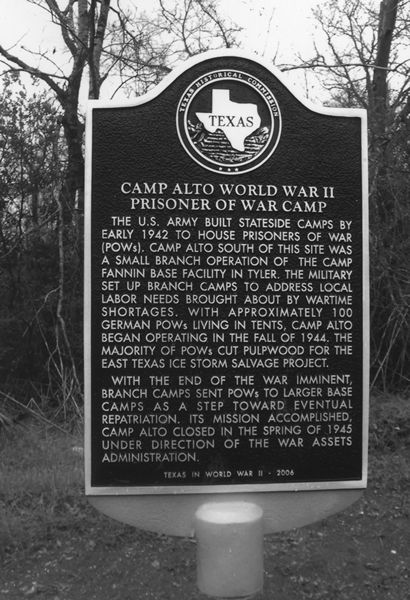
Posted on 10/30/2021 11:28:57 PM PDT by citizen
There were about half a dozen prisoner of war camps in Tennessee during World War II — the best known of which was Camp Crossville, in Cumberland County. We know a lot more about Camp Crossville than the others because of Gerhard Hennes.
Hennes was a German officer captured in North Africa in May 1943. Five months later, he entered the gates of Camp Crossville, where he was interred for two years.
After World War II, Hennes would become an American citizen, and in 2004 he published The Barbed Wire: POW in the USA. In it he gives a detailed description of life at Camp Crossville — a piece of real estate now occupied by the Clyde York 4-H Training Center.
Hennes and his fellow prisoners were treated better than any prisoners of war I’ve ever heard of. They were given new uniforms, they were not interrogated and they were mostly left to the authority of their own German officers.
The best part of Camp Crossville, Hennes claims, was the food. “There were three square meals a day,” he wrote.
(Excerpt) Read more at elizabethton.com ...
Compare and contrast treatment of the German pows then with the Jan 6th people today . And the guards today are “African migrants” no less.
Didn’t the POWs build the working model of the Mississippi River for the Army Corps of Engineers?
My Scoutmaster had been captured in Japan after bailing out of a bomber. Another dad in our troop had been a survivor of the sinking of the Indianapolis. The importance of survival skills, discipline and loyalty to your buddies were very prominent.
Maybe not Frankenmuth proper, but there were several in the area. About a month ago there was a show about them on the CMU or Delta College PBS station that went into great detail about them.
Also in Bayview. A few returned to settle in north Idaho after the war.
We had them near my hometown in NC
“where he was interred for two years.”
Really?
I did a lot of reading about these guys, including those up in Canada. For many, the best thing that ever happened to them, unlike ours.
One thing that did infuriate me though, was that I read, in the South, German POWS sat in the downstairs part of the movies, while black GIs had to sit in the balcony.
I noticed that too. He must have been really good at holding his breath.
There once was a young man named Clyde
Who fell in a privy and died.
Along came his brother
Who fell in another,
And now they’re interred side by side.
That POW camp in Crossville is where we have our annual quilting retreat. It’s gorgeous, quiet, and the history is so interesting. If you MUST be a prisoner, that would be the place.
I’ve heard that the prisoners liked the area so well that they later established their lives there. I don’t know if that’s true, or just lore.
They even had one up at Ft. Lewis (now JBLM). I saw a story where one of the German prisoners carved a very nice model boat for the camp commander as a gift.
There were veterans with business acumen who bought surplus Liberty ships and started their own shipping line. The Boy Scouts and 4-H were two of the largest buyers of former POW camps.
The story of German prisoners not wanting to go home dates back to the American Revolution. When our daughters were attending college in Virginia's famous Shenandoah Valley, we stayed at a budget hotel called "Hessian House." It had a modernistic front connected to a large stone building originally built by Hessian POWs during the American Revolution to house them and later was converted to a tavern on the trail road. The multiple rooms in the large stone building made it ideal for such a repurposing. A local lady told us that many of the POWs who built it chose to stay and farm or work as stone masons in the area after the war ended. One of the officers even sent for his wife and children.
A number of them had been skilled in stone masonry work before becoming a hireling of George III which, I guess, is why the building was still being used more than two centuries later.


“When the Afrika Korps Came to Texas”: World War II POWs in the Lone Star State”

“Hennes, who is now 92”
He would have been 15-16 years-old when the war ended so he must have joined the military at 14 or 15.
That is a very cool story. Thanks for sharing that.
The only one I have is the story of one of my Uncles calling my grandfather to let him know his troop train was going to pass through Shreveport and to call the tamale lady and buy everyone she had. They gave him a grocery sack full of them and he passed them out to all his buddies.
After the war they asked him about how his pals liked the tamales. “They didn’t like them. Those yankees don’t know the difference between good food and dirt”.
My stepfather grew up in Michigan, and he picked fruit alongside German POWs. He was a young teenager during WW II.
Disclaimer: Opinions posted on Free Republic are those of the individual posters and do not necessarily represent the opinion of Free Republic or its management. All materials posted herein are protected by copyright law and the exemption for fair use of copyrighted works.